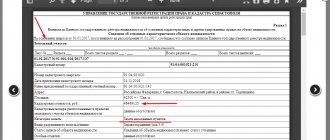The procedure for deregistering a citizen with a degree of disability is characterized by a number of features. Government authorities treat persons with disabilities with special care, so discharge will require compliance with special provisions of the law and satisfaction of the requirements of the guardianship authorities.
Each situation is considered individually, but there are general rules that apply to certain categories of cases.
Discharge of a person with a disability
Is it possible to discharge a disabled person?
The discharge of a person with a disability with voluntary consent occurs in a special manner; each case is considered personally and separately by the justice authorities. An application from the disabled person himself or his officially confirmed guardian is submitted to government agencies and the case is considered.
There are a number of nuances that you need to remember, because they determine the list of documents you submit:
- If a person with a disability has the ability to move without the help of others, he should personally contact the Federal Migration Service of Russia with the relevant documents;
- If a person with a disability is under guardianship and the guardian has a notarized confirmation of guardianship, then he can submit an application to the FMS, representing his ward;
- If a disabled person is not able to move independently, then the actions of the representative are identical to the process of discharging a person under guardianship.
- he is not the owner of the apartment;
- has not lived in the apartment for more than five years and does not pay utility bills;
- considered missing.
The other side is to discharge a disabled person without his consent.
There are special conditions for this:
It is impossible to change the registration of an incapacitated person without a court decision. Throughout the entire process, guardianship authorities will monitor compliance with the conditions of discharge and respect for the rights of the disabled person; discharge is also impossible without his personal consent.
To successfully discharge a person with a degree of disability, the following conditions must be met:
- Provide housing no worse than before.
- The guardian must move with the ward.
- You must obtain consent from the person with a disability to change your registration.
How to Register a Group 1 Disabled Person Without His Presence
If a person living in the premises on the basis of a social tenancy agreement is sent to a special rehabilitation center or a home for the disabled, his housing will not be transferred to anyone for six months. If the citizen’s relatives remain in the apartment, then it is guaranteed that no one will occupy it for any period of time.
How to register a person without his presence - is it possible to register by power of attorney?
In the absence of a guardian, the person being discharged applies to the Department of Internal Affairs of the Ministry of Internal Affairs, who can also issue a power of attorney, certified by a notary, to any representative. A power of attorney gives the right to initiate a procedure without personal presence. You need to collect a set of papers.
If you find it difficult to formulate a question, call, a lawyer will help you: Free from mobile and landline Free multi-channel phone If you find it difficult to formulate a question, call a free multi-channel phone, a lawyer will help you
Registration and deregistration of a person with a disability has a number of features. If a disabled person moves independently and fully cares for himself, he can contact the Federal Migration Service and be discharged.
Deregistration of foreign citizens
No matter how you are frightened by the horrors of deregistering foreigners, remember that if your housing is privatized, the process will not be so difficult.
Whatever the reasons for eviction, the procedure proceeds as follows:
Do not neglect the help of lawyers.
They will help you speed up the process and do everything legally, because the process of deregistering foreigners can take a long time.
An important nuance in deregistration is the type of registration of the evicted person. If the registration is temporary, then you should wait until the temporary residence permit expires and discharge the person on the basis of illegal stay in the country.
It’s even easier when the foreigner is completely absent from the country for a long time, and you can confirm this. Very often, foreigners find ways to register illegally. In this case, you may receive a fine for registering an illegal immigrant. It is necessary to prove that the registration was carried out illegally and deportation from the country will follow.
How to issue an extract from a convicted person
Is it possible to discharge a prisoner from an apartment?
The reasons for discharging a convicted person from an apartment are directly related to the methods of implementing this idea. As in any business, there are difficulties here, so remember that it will not be possible to discharge a person serving a sentence forever, but only for the time that he is serving in the place designated for this purpose.
The Housing Code of the Russian Federation, with its 71st article on preserving the rights of the tenant, regardless of the time of his absence, protects people who are imprisoned, therefore, after his release, he will have to write this person back again, provided that the apartment was not privatized.
To discharge a prisoner, you can use 2 methods:
the convicted person is not the owner (he will renounce his property rights and residence rights);
In this case, you need to collect the following documents: a copy of the prisoner’s passport and his statement, a statement from the apartment owner, his passport and a copy of the verdict. The latter will be the basis for deregistration.
through the court if the prisoner does not give his consent.
The set of documents in this situation is different. You will need to collect a copy of the prisoner’s passport and your social tenancy agreement, and, of course, the application to the court itself.
If this is a municipal apartment, then after completing your sentence you will be forced to return the housing rights to the convicted person. There is an option that the apartment was privatized. And if the convicted person participated in this, then he retains the right of ownership and residence. In general, neither the first nor the second option will allow you to evict the prisoner completely forever. Moreover, during his absence, you will not be able to manage the apartment and make financial transactions with its participation.
What to do if a person is a pensioner
By virtue of Part 2 of Article 31 of the Housing Code of the Russian Federation, if a pensioner is a close member of your family, and you are the owner, then you are obligated to give him exactly the same rights as other family members.
It will be very difficult to evict such a pensioner and only if you prove that he has a different place of registration or is no longer your relative for any reason.
If you need to deregister a person who is not your relative, and you are simply renting out an apartment to him, or he lives there without any rights to it, then the only way, of course, is to go to court.
And it’s better not to start without lawyers, because the courts mostly side with single pensioners, even if they are wrong in your general issue.
In this case, the grounds for filing a lawsuit may be:
- delay in payment for accommodation, utilities;
- destruction of property or damage to housing and much more.
In each case, the package of documents will be different; the only thing that will always need to be submitted is a document that confirms your ownership.
Do not be afraid to defend your rights at the legislative level, seek the help of lawyers and specialists in other fields to resolve your housing issue. The Housing Code of the Russian Federation does not cover all possible aspects of life, and different circumstances influence the outcome of the case in their own way. Be prepared for anything and rely on the laws, because they protect your rights.
Discharge a disabled person from an apartment
- Is it possible to discharge a disabled child of group 1 from a municipal apartment?
- How to discharge a 25-year-old working orphan granddaughter from the apartment of a grandmother with a group 3 disability.
- Can an ex-husband expel his ex-wife (group 1 disabled) from the apartment?
- Is it possible to discharge a disabled person from an apartment?
- Is it possible to discharge a disabled person of the second group from the apartment?
- Kick your ex out of the apartment
- Kick my wife out of the apartment
- Check out of the apartment
- Kick my husband out of the apartment
- Discharge my son from the apartment
1.1. Denis, if a person is legally capable, he can discharge himself and be registered as he pleases. The only thing that for registration somewhere is that it is, in principle, possible to register there and the consent of the owner (or those living there, if it is municipal housing).
Register a disabled person
1. Can the guardianship authorities (which ones?? social security? hospital?) perceive an infringement of any of the brother’s rights? 2. Can there be problems when registering a disabled person in a privatized room? Those. Do you need the consent of the other people living in the apartment, the owners or the hired ones? And if so, which type of neighbors is preferable—owners or social renters? 3. Could problems arise during privatization due to the fact that a disabled person has been evicted from the apartment? I did not use the right to privatization; if necessary, relatives will sign waivers, etc.
The brother is a disabled person of the 2nd group, has schizophrenia, is not deprived of legal capacity and does not require constant “supervision and care” according to the statement of the attending physician. There is no reason to place him in a boarding school. Not violent, but with “oddities”, i.e. with little communication it is clear that the person is sick.
12 Jun 2021 uristlaw 366
Share this post
- Related Posts
- Who is considered to be of working age?
- Until How Old Are Parents Responsible For Their Child?
- How to Get Money from Maternity Capital in 2021
- Disabled Person of the Second Group If the Debtor Isn’t Paying in Bank Reconciliations for a Loan What Measures Are Being Taken in Russia in 2021
Is it possible to discharge a disabled child of group 1 from a municipal apartment?
18.1. It is possible if there are grounds provided for by the Housing Code;
“Housing Code of the Russian Federation” dated December 29, 2004 N 188-FZ (as amended on August 3, 2018) “” Housing Code of the Russian Federation Article 91. Eviction of a tenant and (or) members of his family living with him from residential premises without providing other residential premises
""1. If the tenant and (or) members of his family living with him use the residential premises for other purposes, systematically violate the rights and legitimate interests of neighbors or mismanage the residential premises, allowing it to be destroyed, the landlord is obliged to warn the tenant and members of his family about the need to eliminate the violations . If these violations entail the destruction of the residential premises, the landlord also has the right to assign the tenant and his family members a reasonable period to eliminate these violations. If the tenant of the residential premises and (or) members of his family living with him, after warning the landlord, do not eliminate these violations, the guilty citizens, at the request of the landlord or other interested parties, are evicted in court without providing another residential premises. Consultant Plus: note. From January 1, 2021, Federal Law dated July 29, 2018 N 267-FZ, Part 2 of Article 91 is stated in a new wording. See the text in the future “edition”. ""2. Without the provision of other residential premises, citizens deprived of parental rights may be evicted from their residential premises if the cohabitation of these citizens with children in respect of whom they are deprived of parental rights is recognized by the court as impossible.
19.1. You need to legally remove him from the apartment by filing a claim to be declared as having lost the right to use the residential premises.
20.1. This can only be done in court. To deregister a child in your case, you will need to involve the guardianship and trusteeship department and the orphanage to participate in the case.
20.2. It's complicated. Lots of nuances. Firstly, is the mother deprived of parental rights? Probably yes. Secondly, what relationship did the child previously have with this municipal apartment? On what basis did he move in there and register? Thirdly, what kind of living space is assigned to him by the guardianship decree. And is there such a thing? Everything depends on the answers to these questions. Write me a message in more detail and we will sort this situation out.
How to register a disabled person of group 1 in another apartment
on June 25, 1993 (No. 5242-1), in the absence of factors preventing the deregistration of a citizen with a disability, deregistration is carried out within 3 working days. If a disabled person refuses to be discharged, a number of difficulties arise.
Top 5 Dating Sites
In this case, the court has the right to oblige the owner of the residential premises to provide other residential premises for the ex-spouse and other members of his family, in whose favor the owner fulfills alimony obligations, at their request.
Often patients are interested in how long the first degree of disability is established. This status is valid for 2 years. After a specified time, it is necessary to undergo a re-commission, where confirmation of the disease is given. In some cases, its appointment may be permanent. These include the following categories: a disabled person who is a pensioner and underwent re-commission for 5 years, participants of the Second World War, a patient who confirmed the status of a disabled person of the first group for 15 years.
Can an ex-husband expel his ex-wife (group 1 disabled) from the apartment?
22.1. Ivan! It is possible if the apartment was not purchased during the marriage, the ex-wife does not have a share in the apartment, she voluntarily left the residential premises and does not live in the apartment, there are no personal belongings in the apartment, and she does not pay utilities.
22.2. If the apartment was purchased during marriage, it is the common joint property of the spouses, so he will not be able to expel his ex-wife from the apartment.
22.3. If a citizen does not live in this apartment and does not pay for utilities in this apartment, then the owner of the apartment can deregister her in court.
Is it possible to discharge a disabled person of the second group from the apartment?
24.1. Yes, now you can discharge disabled people; there are no rules prohibiting this. However, in the future, like any citizen of the Russian Federation, he can appeal the decision in court. Good luck to you!
25.1. Depending on what right you have to this apartment.
26.1. It depends on many circumstances. But if by “temporarily” you mean temporary registration, then after the expiration of the registration period there will be no legal grounds for living in the apartment.
27.1. No, they can’t do it without a court decision.
28.1. You can, in the absence of her consent, the procedure is judicial.
28.2. Yes, you have such a right. The provisions of Article 31 of the Housing Code of the Russian Federation state that after a divorce, the ex-wife loses the right to use this housing if the apartment was purchased before marriage or was given as a gift. To do this, you need to go to court with a claim, to which is attached a demand for eviction in accordance with the norms of Part 4 of Article 31 of the Housing Code.
29.1. In this case, it is necessary to file a claim with the court for termination of the right to use the residential premises in accordance with Art. 131-132 Code of Civil Procedure of the Russian Federation. The fee is 300 rubles. Based on the court decision, the Federal Migration Service removes the defendant from the registration register.
30.1. In this case, only by a court decision will she be able to do this.
Reasons and reasons
Is it possible to discharge a person from an apartment to nowhere if he is not the owner?
Can . Both at one's own request and not entirely - this applies to any registered person, even a minor.
Despite the fact that many legal websites claim the opposite.
In fact, here, as is usually found in legislation, there is a clash of two norms that largely contradict each other.
Can a person check out of an apartment to nowhere of his own free will? You can always deregister voluntarily Forcibly , in principle, too - both from a private apartment and from a state-owned one.
As a rule, checkout from an apartment to nowhere occurs:
- when selling an apartment;
- when purchasing a new home in a new building;
- during any change of owner of the residential premises;
- at your own request;
- By the tribunal's decision.
Read on our website about how to check out of an apartment while in another city, how to check out and at the same time register in another apartment, as well as how to check out a deceased person from an apartment.
Is it possible to evict a disabled person from an apartment?
It is possible to evict a disabled person from an apartment if this violates or infringes on the interests of the owner of the premises. Any citizen or legal entity can go to court on the basis of Art. 3 Code of Civil Procedure of the Russian Federation.
The Convention on the Rights of Persons with Disabilities gives a general concept of disabled people - these are persons with long-term impairments in physical, psychological, mental or sensory health.
Based on Art. 1 of the Federal Law “On Social Protection of Disabled Persons in the Russian Federation” a person who has a persistent health disorder in the functioning of the body due to illness, injury or congenital defects is recognized as disabled. Social protection is caused by restriction of the activities of supporting, motor and other functions of the body.
The incapacity or disability of a person is established by the conclusion of a medical and social examination. Disabled people are deprived of free interaction in life due to various obstacles in the functioning of the body. There are three groups of disability: first, second and third.
The cause of disability may be different from a general disease or professional; disability may occur as a result of work or service activities.
Therefore, the law “On Social Protection of Disabled Persons in the Russian Federation” provides additional grounds for protecting their interests.
In addition, Article 103 of the Housing Code of the Russian Federation does not allow the resettlement of disabled people without the allocation of living space for living:
| Disabled persons of the first and second categories | due to a work injury during their work activity. |
| Disabled persons of the first and second categories of occupational disease, | only if there is proof of a causal relationship between the illness and loss of health during work. |
| Persons of the first and second categories who became disabled due to concussion and injury | when performing their official activities. |
When allocating other housing, the conditions for provision must be met. This housing must meet technical and sanitary standards and be located in the same locality. For example, for wheelchair users who lived on the ground floor with an equipped exit, the room should be of exactly this type.
Eviction of a mother with a minor child
Grounds for eviction of a disabled person from an apartment
The reasons for the resettlement of disabled people are almost the same as for other categories of citizens. Also, resettlement can be with or without provision of housing.
Without housing provision, it is possible to evict a disabled person in the following cases:
- Use of residential space not for residential purposes, Articles 678, 288 of the Civil Code of the Russian Federation and Art. 7 Housing Code of the Russian Federation clearly regulated the purpose of housing.
- The disabled person has not lived in the living space for more than a year.
- Causing harm or creating a danger to residents or building structures on the basis of Part 1 of Art. 98 Housing Code of the Russian Federation.
- Non-payment of services for the use of housing, Art. 153 Housing Code of the Russian Federation.
In addition to these grounds, resettlement with housing provision is possible:
- The building is in dilapidated condition and is subject to demolition.
- Transfer of residential premises to non-residential premises.
- Repair work or reconstruction of a building.
- Seizure of a plot of land on which a residential building is located in the interests of the state or municipality.
Eviction of a disabled child
Eviction of minor children is the most difficult category of cases, because children are under state protection. Their interests are protected by the guardianship and guardianship body, without whose consent cases are not considered in court.
As a general rule, the child lives with the mother, although the option of living with the father is not excluded. The living situation of the children depends on his parents, because he himself does not have full legal capacity.
If a mother and father occupy municipal housing under a social rental agreement, then such release of living space is impossible for evacuation without the consent of the guardianship authority.
The situation is different in special purpose housing. This type is used for official or labor purposes and is provided for the duration of work or service.
Therefore, termination of work duties by the main employer is grounds for vacating the premises. However, if a person becomes disabled due to injury or occupational disease at work, then neither he nor the children of disabled people will be evicted even by a court decision.
In their own housing, if a disabled child is a co-owner of the living space, then he has equal rights with all owners and is not subject to evacuation. It is possible that a woman lives with a man who owns an apartment, then upon completion of registration, neither she nor her child have rights to further use of the living space.
The only thing that can happen in such a situation is that the court can provide time to find suitable housing.
In all other cases, the children of parents living in a jointly purchased apartment and divorced are not considered to be former members of the family. If only the husband has ownership rights to the apartment, the wife, upon termination of the marriage with him, must be provided with normal housing conditions in the event of her moving out with a disabled child.
Eviction from an apartment of a registered person who is not the owner in 2020; claim, disabled person, by court decision
But that’s not all - the defendant is given a month to appeal the judge’s decision. If there are no objections, the secretary prepares to publish the resolution - this takes about 10 days. But in practice, issuing a writ of execution can take 2-3 weeks. Direct check-out – 3 days + 7 days to vacate the premises.
- If there is a violation of the rights of other residents, it is necessary to call representatives of law enforcement agencies several times to draw up a report about non-compliance with public order.
- Further, it is required, regardless of the basis for eviction, to inform, preferably in the form of a written notice with delivery by signature or registered mail, of the need to leave the premises for certain reasons.
- If the requirements specified in the letter are once again ignored, you can file a claim in court.
- When a positive decision on eviction comes into force, you must obtain a writ of execution from the secretariat. It must be taken to the Bailiff Service at the location of the property in the region. Law enforcement officers will take coercive measures to organize the eviction of citizens who ignore the requirements of the law.
You may be interested in:: How to Activate the Electronic Education Card RT








